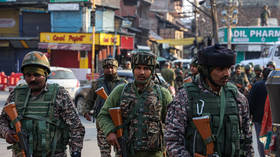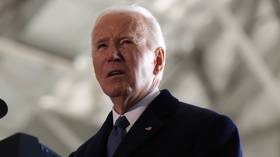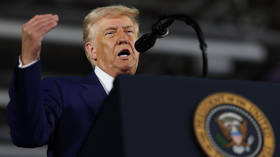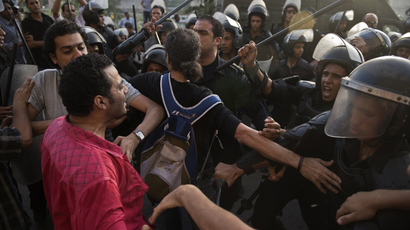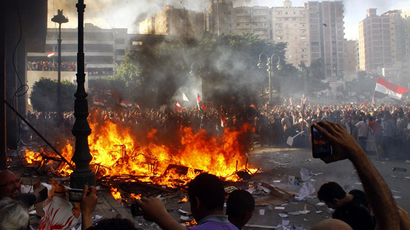Egypt’s deposed Morsi charged with leaking state secrets to Qatar
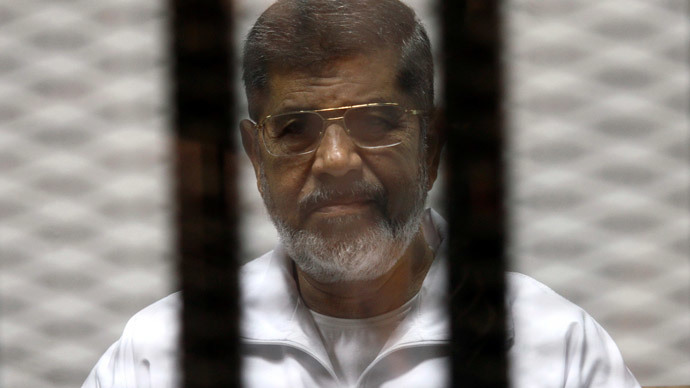
Former Egyptian President Mohamed Morsi is facing fresh charges of handing over state secrets to Qatar. Morsi, the deposed leader of the banned Muslim Brotherhood party, is currently in jail under investigation over inciting violence.
A secret investigation was carried out by the Cairo public prosecutor’s office, which announced on Saturday they had uncovered enough evidence against Morsi to press charges. They say the former president is guilty of leaking sensitive documents to the Qatari government and television channel Al Jazeera.
"The inquiries... exposed humiliating facts and the extent of the largest conspiracy and treason carried out by the terrorist Brotherhood organization against the nation through a network of spies," it said in a lengthy statement.
The Cairo public prosecutor’s office also stated that some of those documents exposed the location of and weapons held by the Egyptian armed forces and detailed the country's foreign and domestic policies. Two of Morsi’s top secretaries were also charged with leaking sensitive information. No date has been set for the new trial.
The Muslim Brotherhood responded with disbelief at the charges.
"Today is the start of yet another kangaroo trial... Morsi's trials are politically motivated cases with trumped up charges and a corrupt judiciary presiding over it," Abdulla El-Haddad, a Brotherhood spokesman based in Britain, said by email.
Qatar openly supported Muslim Brotherhood
The Qatari Foreign Ministry in Doha did not immediately respond to requests for comment on the accusations. Meanwhile, Al Jazeera, which has been banned from Egypt, has denied any bias in reporting events there or any role in aiding the Brotherhood.
During his short reign, Morsi reportedly received strong support from Qatar, but relations between Cairo and Doha have cooled significantly since Egypt’s former ruler was ousted from power. He was replaced in July 2013, when the army chief, Abdel Fattah al-Sisi took over, following massive protests against his leadership. Morsi was the first democratically elected president in Egypt’s history.
His party, the Muslim Brotherhood, has since been banned and has been named as a terrorist organization. Morsi is currently in jail on charges of inciting violence along with hundreds of other Muslim Brotherhood supporters, many of whom are facing the death penalty, including the former president.
The military-backed government defends its actions by arguing that it simply wants to restore order to the streets, even going as far as linking efforts to thwart those giving them trouble to a "war on terrorism.”

Political crackdowns not decreasing under al-Sisi
Amnesty International has painted a grim picture of Egypt since al-Sisi took over, saying there has been a “catastrophic decline in human rights.” There has also been wide spread oppression, thousands of arbitrary arrests, “harrowing” incidents of torture and deaths in police custody.
“Egypt’s notorious state security forces – currently known as National Security – are back and operating at full capacity, employing the same methods of torture and other ill-treatment used during the darkest hours of the Mubarak era,” said Hassiba Hadj Sahraoui, deputy director for the Middle East and North Africa at Amnesty International.
While exact figures are difficult to come by, The Associated Press reported in March that at least 16,000 people had been detained as part of a sweeping crackdown on supporters of Morsi, the conservative Islamist leader who was elected president in 2012 and deposed in a year later.
In June, three Al Jazeera journalists were sentenced to long prison terms, one to 10 years and two to seven years, after finding them guilty on charges that included helping the Muslim Brotherhood by publishing false information.
Judge Mohamed Nagui Shehata sentenced Mohammed Fahmy, Canadian-Egyptian acting bureau chief of Al Jazeera, Australian correspondent Peter Greste, and Egyptian producer Baher Mohamed to seven years for supporting a "terrorist organization." Mohamed also received an extra three years in prison on separate charges.
The New York-based NGO Human Rights Watch estimated that at least 1,400 protesters had been killed in protests and political violence since July 3, 2013, and “most likely scores more.” Security forces have been accused of repeatedly using excessive and arbitrary force to disperse protests.

However, Morsi was also deeply unpopular amongst large numbers of the Egyptian people. Before he was ousted, a petition managed to collect 22 million signatures in just two months in 2013 calling for Morsi to step down.
His opponents accused Morsi of trying to monopolize political power in the country, by proposing an openly Islamist constitution, stuffing the bureaucracy with his associates, and banning the courts from overruling his decisions.
“The agenda is not about health reform or how to build an Egyptian Harvard or Yale,” said Moataz Abdel Fattah, a political scientist at the American University in Cairo. “It is just a competition over who should preside and set the rules.”
Protesters also said Morsi mishandled the economy, with electricity and fuel shortages now becoming a regular feature of daily life, as the government tries to secure more loans from international financial organizations.
“The executive branch has no clue how to run Egypt. It’s not a question of whether they are Muslim Brothers or liberals — it’s a question of people who have no vision or experience. They do not know how to diagnose the problem and then provide the solution. They are simply not qualified to govern,” wrote Nobel Peace Prize winner and opposition figurehead Mohammed ElBaradei in Foreign Policy magazine.
In April, 683 Muslim Brotherhood supporters loyal to ex-president Morsi were sentenced to death in a widely criticized mass trial. Of the 683, all but 110 were tried in absentia. This decision was widely condemned, with former UN Human Rights chief, Navi Pillay, labeling the death penalty convictions and mass trials "obscene and a complete travesty of justice.”






